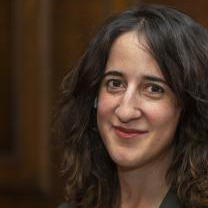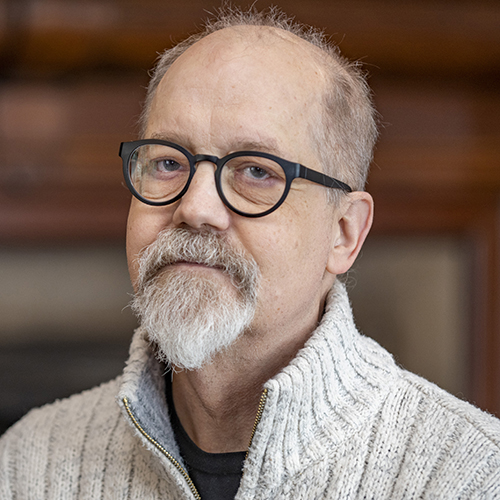
Isaac Mehlhaff is an Assistant Professor in the Department of Political Science and is also affiliated with the Data Science Institute, Committee on Data Science, and Program in Political Economy at the University of Chicago.
His research is driven by substantive questions in public opinion and political psychology: How and why do citizens change their attitudes on political issues? Under what conditions can political discussion exacerbate or ameliorate mass polarization? How is polarization causally related to other features of government and society? He approaches his work primarily as a computational social scientist, using and developing methods in natural language processing, machine learning, and Bayesian modeling.
He received his PhD in 2023 from The University of North Carolina at Chapel Hill. He also holds an MA from UNC-Chapel Hill and a BA from the University of Wisconsin-Madison.

Paul Poast is an associate professor in the Department of Political Science at the University of Chicago, where his area of research and teaching is international relations. Please visit his personal website to learn more about his research, writing, and teaching.

Lisa Wedeen is the Mary R. Morton Distinguished Service Professor of Political Science and the College and Director of the Chicago Center for Contemporary Theory at the University of Chicago. She is also Associate Faculty in Anthropology. Her publications include three books: Ambiguities of Domination: Politics, Rhetoric, and Symbols in Contemporary Syria (1999; with a new preface, 2015); Peripheral Visions: Publics, Power, and Performance in Yemen (2008); and Authoritarian Apprehensions: Ideology, Judgment, and Mourning in Syria (2019). Among her articles are the following: “Conceptualizing ‘Culture’: Possibilities for Political Science” (2002); “Concepts and Commitments in the Study of Democracy” (2004); “Ethnography as an Interpretive Enterprise” (2009); “Reflections on Ethnographic Work in Political Science” (2010); “Ideology and Humor in Dark Times: Notes from Syria” (2013); and “Scientific Knowledge, Liberalism, and Empire: American Political Science in the Modern Middle East” (2016). She is the recipient of the David Collier Mid-Career Achievement Award and an NSF fellowship. For Authoritarian Apprehensions, she received the American Political Science Association’s Charles Taylor Book Award (2020), sponsored by the Interpretative Methodologies and Methods group; the APSA’s inaugural Middle East and North Africa Politics Section’s best book award (2020); the IPSA award for Concept Analysis in Political Science (2021); and the Gordon J. Laing Award (2022), given annually for the book that brings the most distinction to the University of Chicago Press. She has completed an edited volume with Joseph Masco entitled Conspiracy/Theory (forthcoming Duke University Press, 2024); she is in the process of coediting an Oxford University Handbook, with Prathama Banerjee, Dipesh Chakrabarty, and Sanjay Seth, tentatively entitled Reimagining Cosmopolitanism (Oxford University Press); and, with Aarjen Glas and Jessica Soedirgo, the interpretive methods part of an Oxford University Handbook on Methodological Pluralism in Political Science (edited by Janet Box-Steffensmeier et al.). Wedeen is also beginning work on a monograph on violence and temporality.

Rochelle Terman is an assistant professor in the Department of Political Science at the University of Chicago. She specializes in international norms and human rights. Her first book, The Geopolitics of Shaming: When Human Rights Pressure Works—and When It Backfires, was published in 2023 with Princeton University Press. Terman has also produced work on gender, Islamophobia, and computational social science. She is currently a faculty affiliate with the Center for Middle Eastern Studies, the Center for the Study of Gender & Sexuality, the Committee on International Relations, and the Program on Computational Social Science.
Terman earned her B.A. from the University of Chicago, and Ph.D. in Political Science with a designated emphasis in Gender & Women’s Studies from the University of California, Berkeley. She joins the University of Chicago from Stanford University, where she was a post-doc at the Center for International Security and Cooperation.

Patricia Posey is an Assistant Professor at the University of Chicago as well as the Political Science Department’s junior faculty member for the Race and Capitalism Project, where she specializes in race and American political economy.
Her current book project examines the effects of different banking and loan institutions on political attitudes and political participation. She is particularly interested in the effects of check cashing institutions, payday loan companies, pawn shops, and the like (collectively known as the fringe economy) on the atittudes of poor, black, and brown communities toward the state. The manuscript is based on her award winning dissertation project which was awarded the Urban Politics Section’s Byran Jackson Dissertation Research on Minority Politics Award and supported by the Ford Foundation Dissertation Fellowship, the University of Pennsylvania School of Arts and Sciences’ Teece Fellowship, and the Department of Political Science.
Dr. Posey’s research broadly examines the relationship between American political economy and race, with a focus on the links among capitalism, urban space, technology, and political behavior. She has a book chapter with Daniel Gillion on the effects of minority protest on government responsiveness that is forthcoming with Cambridge University Press. Additionally, she has published with The Washington Post Monkey Cage and the Journal of Race, Ethnicity, and Politics - Politics of Color. More about her research is available here.
Prior to joining the Political Science Department at the University of Chicago, Patricia Posey was a Pre-Doctoral Fellow at the Massachusetts Institute of Technology as well as a Andrew W. Mellon Fellow in Digital Humanities at the University of Pennsylvania, where she specialized in American Politics. She has been recognized as a Fontaine Fellow, Ford Foundation Dissertation Fellow, American Political Science Association Ralph Bunche Scholar, and American Political Science Association Minority Fellow.
Patricia Posey recieved her PhD in Political Science from the University of Pennsylvania in 2019 and a double BA in Political Science and Sociology from the University of Florida in 2013.

Molly Offer-Westort’s work on statistical methodology for social science research integrates machine learning methods with experimental design to answer causal questions. She also has an ongoing substantive research program that examines online behavior to understand how people change their views and attitudes in response to the conversations they take part in and the information they engage with online. She combines these agendas in social media experiments, using approaches like adaptive assignment and policy learning, and incorporating natural language processing methods for flexible conversational interventions.
She has conducted social media experiments to identify the most effective interventions for curbing the spread of misinformation online, to optimally target informational messaging to people hesitant to adopt vaccines, and to measure the efficacy of online deep canvassing. Her work in statistical methodology develops and advances tools for experimental design and analysis, with a particular focus on adaptive experimentation.
Offer-Westort's PhD is joint in Political Science and Statistics & Data Science, conferred by Yale University in 2019; Offer-Westort also holds a Masters in Statistics, also from Yale, and a Masters in Public Affairs, from the Princeton School of Public and International Affairs.

Andy Eggers is a political scientist whose research focuses on electoral systems, corruption/accountability, the relationship between money and politics, and political development in the U.S., Britain, and France. He also has an interest in research methodology.
From 2014-2020, he was a Professor in the Department of Politics and International Relations at the University of Oxford, a Professorial Fellow of Nuffield College, and Director of the Oxford QStep Centre. From 2011 to 2014 he was an Assistant Professor in the Department of Government at the London School of Economics.

John Brehm is Professor of Political Science at the University of Chicago. Brehm is a specialist in the study of American political behavior, with an emphasis on public opinion and political organizations. Brehm's first book, The Phantom Respondents: Opinion Surveys and Political Representation (Michigan Press, 1993), studies one of the most serious flaws in the public opinion industry, namely, the enormously high non-response rates. This book develops a psychologically based model to explain why people choose or refuse to participate in surveys, and then uses that model to examine the consequences of non-response for analysis of politics.
Recent Research / Recent Publications
Teaching, Managing Tasks, and Brokering Trust: Functions of the Public Executive with Scott Gates (Russel Sage Foundation, 2008).
Working, Shirking, and Sabotage: Bureaucratic Response to a Democratic Public with Scott Gates (University of Michigan Press, 1997).
Hard Choices, Easy Answers: Values, Information, and Public Opinion with R. Michael Alvarez (Princeton University Press, 2002).
The Phantom Respondents: Opinion Surveys and Political Representation (University of Michigan Press, 1993).